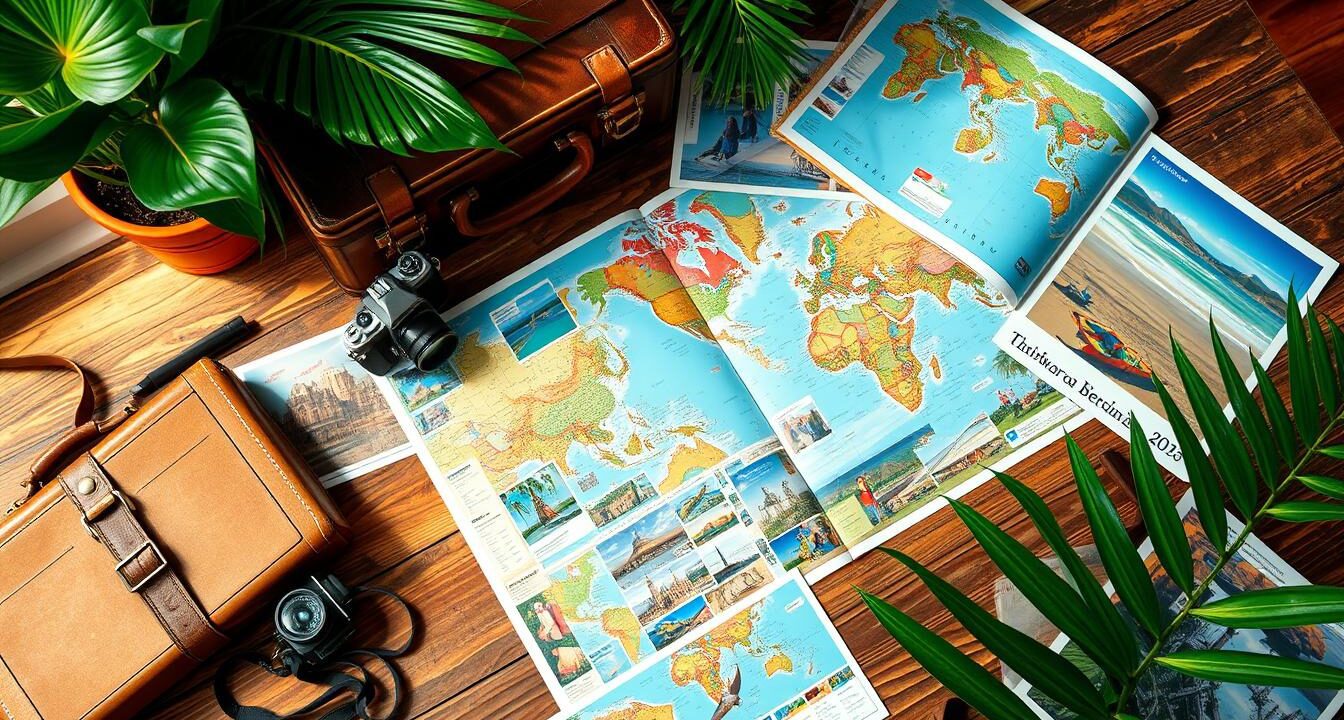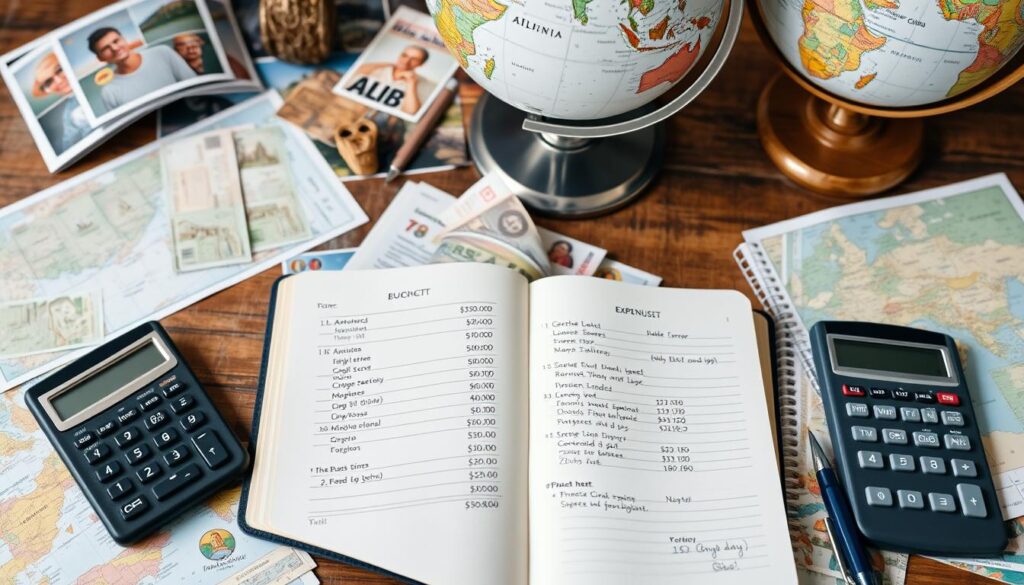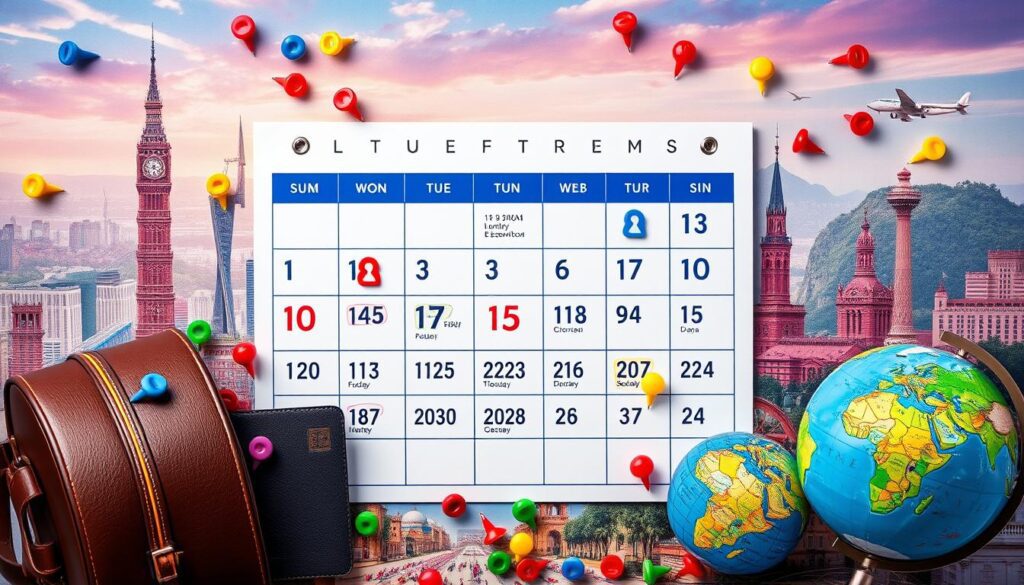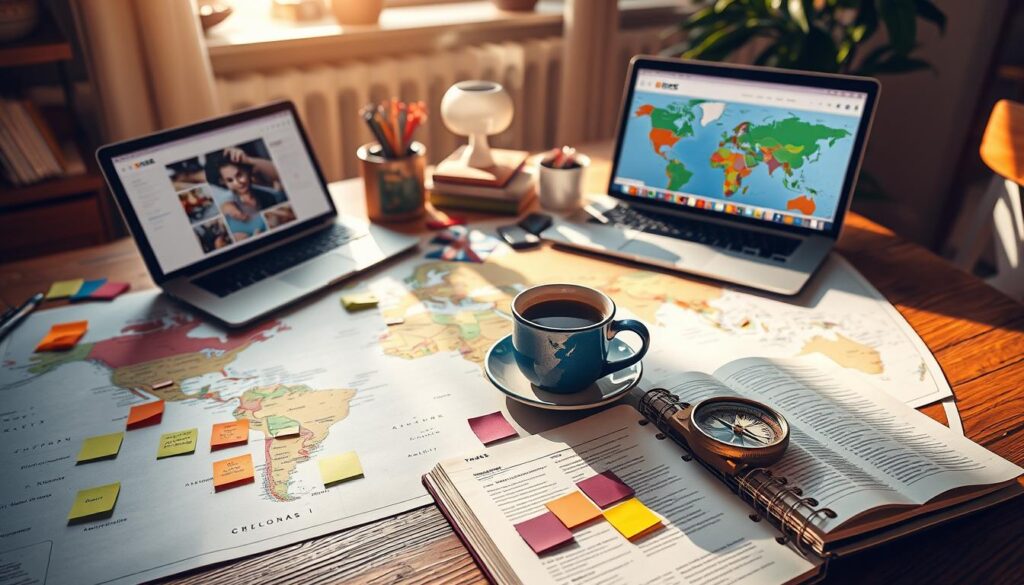
I’ve spent years writing about travel and planning trips. I know how exciting and challenging it can be. Whether you’re going on a big adventure or a short weekend trip, the best memories start with good planning. In this guide, I’ll share my top tips to make your travel plans perfect for you.
By the end, you’ll know how to turn your travel dreams into a smooth reality. You’ll be ready to plan your next trip with confidence.
Key Takeaways
- Understand your personal travel style and the dynamics of your travel group to build a customized itinerary.
- Establish a realistic travel budget to ensure your trip is financially comfortable and stress-free.
- Discover the best destinations for your interests and travel style, leveraging online resources and expert insights.
- Time your travel dates strategically to take advantage of the best flight deals and avoid peak crowds.
- Craft a detailed yet flexible itinerary that balances must-see attractions with spontaneous experiences.
Understanding Your Travel Style and Group
Planning your best travel itinerary begins with knowing your travel style and group. Do you like a set plan or a flexible trip? Do you want to relax or explore a lot? The people you travel with also shape your plans. For example, a family trip is different from a romantic getaway.
What's Your Trip Style?
Think about your travel pace and the trip’s atmosphere. Adventure travelers seek thrilling activities. Romantic travelers prefer beautiful, quiet spots. Intellectual travelers enjoy cultural and historical sites. First-time international travelers often choose well-known places.
Knowing your style helps you plan a trip that’s both rewarding and stress-free.
Who Are You Traveling With?
Your travel group’s makeup influences your plans. Danger junkies seek out unique places. Travelers seeking unique cultural experiences want real interactions. Luxury travelers value comfort, while budget-conscious travelers look for deals.
Understanding your group’s preferences ensures your trip meets everyone’s needs.
Reflecting on your travel style and group dynamics is key. It helps you create a perfect travel plan. This step is crucial for a stress-free trip.
Establishing Your Travel Budget
Starting your dream vacation begins with a key step: setting a travel budget. This budget is your guide as you plan your trip. Knowing how much you can spend helps you make choices that fit your budget and dreams.
Think about what you’ll need for your trip, like where to stay, how to get around, food, activities, and unexpected costs. Look up typical costs for your destination to plan better. Travel often takes longer than you think, so add extra time and delays to your budget.
Make your trip special by focusing on what you love. Look up top activities and prices in travel books and online. This way, you can enjoy your trip without breaking the bank.
Also, plan for rest days. It’s important to rest, especially in busy cities. A good mix of exploring and relaxing makes your trip memorable and affordable.
| Budget Category | Estimated Costs |
|---|---|
| Transportation | $500 – $1,000 |
| Accommodation | $800 – $1,500 |
| Meals | $400 – $800 |
| Activities | $300 – $700 |
| Miscellaneous | $200 – $500 |
| Total Budget | $2,200 – $4,500 |
Think about your travel style, who you’re with, and your budget to plan a great trip. The goal is to find a balance between what you want and what you can afford.

Choosing Your Destination
Finding the perfect travel spot can be tough, with so many great places to choose from. But, with the right tools and some key things to think about, you can pick a place that fits your style, group, and budget.
Best Places to Find Inspiration
Looking at beautiful photos on Pinterest and Instagram can give you ideas for your next trip. Reading travel blogs and forums can also help. Plus, watching for flight deals and Groupon Getaways can lead you to amazing, affordable places.
When you’re looking, remember to think about things like travel papers, safety, and the time of year. This way, you can find a travel destination that’s just right for you.
| Destination Inspiration Sources | Percentage of Travelers |
|---|---|
| Social Media (Pinterest, Instagram) | 58% |
| Travel Blogs and Forums | 47% |
| Flight Deal Websites | 42% |
| Groupon Getaways | 35% |
“The world is a book, and those who do not travel read only a page.” – Saint Augustine
Determining the Ideal Travel Dates
Choosing the right travel dates is key to a great vacation. Knowing your destination’s seasons and major events helps find the best time to visit. This way, you can enjoy your trip more, whether you’re looking for good weather, fewer people, or lower prices.
Things to Consider
High season means better weather but more people and higher prices. Low season has fewer tourists and lower costs but might not be as pleasant. Shoulder season is a good middle ground, with nice weather and fewer crowds.
Also, think about any big events or holidays during your trip. They can change prices, availability, and the vibe of your destination. By looking at these details, you can pick the ideal travel dates for your trip.
| Consideration | High Season | Low Season | Shoulder Season |
|---|---|---|---|
| Weather | Excellent | Potentially less ideal | Mild and pleasant |
| Crowds | Larger crowds | Fewer tourists | Manageable crowds |
| Pricing | Higher costs | Lower prices | Moderate pricing |
| Availability | Limited availability | More availability | Good availability |
By thinking about these points, you can pick the best travel dates for your trip. This ensures a memorable vacation.
“Timing is everything when it comes to travel. By choosing the right vacation timing, you can unlock a world of possibilities and create memories that will last a lifetime.” – Travel Enthusiast

Booking Your Flights for the Best Travel Itinerary
Now that you’ve picked your destination and travel dates, it’s time to book your flights. Look for the best time to book, usually 115 to 21 days before for U.S. trips. Use flight search tools like Google Flights, CheapAir.com, and Skyscanner to find the best deals.
How to Get the Best Deal on Your Flight
Think about taking a connecting flight to save money. But remember, it might not be as convenient. With the right tools and strategies, you can find flights that fit your budget.
Booking on Tuesday – Thursday can be cheaper. Also, try the +/- 3 days option on Kayak.com to find better deals. Look for flights on Saturday nights, red-eyes, or early mornings.
For international trips, compare prices by looking at flights to major hubs like Hong Kong or Singapore. This can save you money, especially for places like Bali.
“Offering up to seven days of free stopovers, Icelandair presents an opportunity for travelers connecting in Reykjavík to explore destinations like the Blue Lagoon, a feature that could entice travelers.”
Use price predictors on Kayak and Bing Travel to guess when airfare deals will happen. This helps you make smart flight booking choices.
Don’t forget to buy travel insurance to protect against cancellations or unexpected events. Also, pick the right credit card for travel perks like free checked bags, fast security, and more miles for future trips.
Creating a Realistic Best Travel Itinerary
After booking your flights, it’s time to plan your travel itinerary. You need to mix big dreams with realistic scheduling. Start by making a list of all the things you want to do and see. Then, sort them out by importance.
Find out how long each activity will take. Don’t forget to think about transit considerations between places. Use itinerary tools like TripIt, TripCase, and TripHobo to organize your plans and see how they fit together.
Make sure to leave some extra time between activities. Avoid overloading your schedule, as things don’t always go as planned. A realistic itinerary lets you enjoy your trip fully. A Booking.com survey found that 75% of travelers want to experience local culture, so include those moments in your activity timing.
| Itinerary Planning Insights | Percentage of Travelers |
|---|---|
| Find it important to have a well-crafted travel itinerary | 95% |
| Prioritize budgeting, organizing, and planning their travel itineraries | 70% |
| Prefer creating a travel itinerary that incorporates details like reservations, directions, phone numbers, and fees | 80% |
| Recommend researching locations, compiling information, and knowing local customs before the trip | 60% |
| Suggest creating a map to visit destinations sequentially | 85% |
| Allocate time for morning, daytime, and evening commitments during at least three consecutive days | 75% |
By using these tips and itinerary tools, you can make a realistic and organized travel plan. This will make your trip smooth and fun.

Leaving Room for Spontaneity
Traveling well means having a good plan, but the best moments come from the unplanned. Flexible travel lets us enjoy spontaneous experiences and itinerary adjustments. This way, we find the most unplanned discoveries and travel adaptability.
For my next trip, I have 6 days in Paris and over 2 in Barcelona. I’ve left some extra days for surprises. Over time, I’ve moved from strict planning to a more open approach.
I no longer book everything in advance. Instead, I look for new paths and local tips. This travel adaptability has made my trips more memorable and full of surprises.
“Leaving room for spontaneity is the key to unlocking the true essence of a destination. You never know what unexpected delights await when you’re open to the possibilities.”
I’m looking forward to this trip, ready for whatever comes next. Saying yes to new experiences will make my journey even more special.
Chancing upon a local festival or exploring a new neighborhood can make a trip unforgettable. By embracing the unexpected, I’m sure this journey will be one to remember.
Conclusion
Creating your best travel plan is a mix of strategy and flexibility. Know your travel style and group, and set a realistic budget. Choose your destination and travel dates carefully. Book flights smartly and make a flexible itinerary.
This way, you’ll have a smooth and enjoyable trip. The planning should be fun, just like the trip itself.
Start your journey with excitement and a sense of adventure. Use these travel planning tips, itinerary optimization strategies, and tips for stress-free travel and maximizing vacation experiences. They will help you have an unforgettable trip.
With good planning and flexibility, you’ll make the most of your travels. You’ll create memories that will inspire you for years to come.
When you start your next trip, remember these tips. Let your love for travel guide you. Happy travels!
FAQ
What is the first step in planning my best travel itinerary?
Start by knowing your travel style and who you’re traveling with. Think about whether you like a set plan or a flexible trip. Your pace and the people you’re with will shape your plans.
How do I establish a realistic budget for my trip?
First, figure out how much you can spend. Consider your savings, vacation days, and financial goals. A clear budget helps you choose where to stay, how to get there, and what to do.
What are some tips for choosing the best destination for my trip?
Look at travel needs, safety, and the best times to visit. Use photos, blogs, and deal sites to find inspiration. Groupon Getaways can also help you find amazing deals.
How do I determine the ideal travel dates for my trip?
Check the seasons to find the best time to visit. High season is great but pricey, while low season is cheaper but less ideal. Shoulder season is a good middle ground. Also, consider any big events or holidays that might affect your trip.
What is the best way to book flights for my travel itinerary?
Look for the best booking window, usually 115 to 21 days in advance for U.S. flights. Use tools like Google Flights to compare prices. Consider a layover to save money, but think about the extra hassle.
How do I create a realistic travel itinerary?
List your must-see spots and prioritize them. Research each activity’s time and add travel time. Use apps like TripIt to organize your plans. Don’t overpack your schedule to avoid stress.
Why is it important to leave room for spontaneity in my travel itinerary?
A good plan is key, but spontaneity is just as important. Things won’t always go as planned. Having extra days allows for flexibility and new discoveries.
Recent Post
Let Us Plan Your Perfect Trip |
- October 16, 2024
- 12 min read
Top 10 Best Vacation Spots in March
- October 16, 2024
- 8 min read
Top September Vacation Spots: Where to Go
- October 16, 2024
- 9 min read







